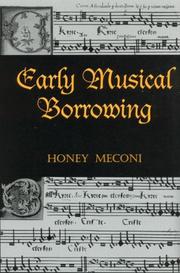| Listing 1 - 2 of 2 |
Sort by
|

ISBN: 1135577935 1135577943 1280047348 020361092X 0203486250 9780203486252 9780815335214 0815335210 0815335210 9786610047345 6610047340 9781135577940 9781280047343 9781135577896 9781135577933 9781138968158 Year: 2004 Publisher: New York Routledge
Abstract | Keywords | Export | Availability | Bookmark
 Loading...
Loading...Choose an application
- Reference Manager
- EndNote
- RefWorks (Direct export to RefWorks)
This collection of essays examines the common compositional practice of borrowing or imitation in fifteenth-and sixteenth-century music.
Music --- Quotation in music. --- Borrowing (Music) --- Musical borrowing --- Art music --- Art music, Western --- Classical music --- Musical compositions --- Musical works --- Serious music --- Western art music --- Western music (Western countries) --- History and criticism.
Book
ISBN: 025205072X 9780252050725 9780252083679 9780252033155 0252033159 0252083679 Year: 2018 Publisher: Urbana, Chic. University of Illinois Press
Abstract | Keywords | Export | Availability | Bookmark
 Loading...
Loading...Choose an application
- Reference Manager
- EndNote
- RefWorks (Direct export to RefWorks)
A Renaissance woman long before the Renaissance, the visionary Hildegard of Bingen (1098-1179) corresponded with Europe's elite, founded and led a noted women's religious community, and wrote on topics ranging from theology to natural history. Yet we know her best as Western music's most accomplished early composer, responsible for a wealth of musical creations for her fellow monastics. Honey Meconi draws on her own experience as a scholar and performer of Hildegard's music to explore the life and work of this foundational figure. Combining historical detail with musical analysis, Meconi delves into Hildegard's mastery of plainchant, her innovative musical drama, and her voluminous writings. Hildegard's distinctive musical style still excites modern listeners through wide-ranging, sinuous melodies set to her own evocative poetry. Together with her passionate religious texts, her music reveals a holistic understanding of the medieval world still relevant to today's readers.
Composers --- Women composers --- Composers, Women --- Women as composers --- Women musicians --- Hildegard, --- Bingen, Hildegard von, --- Hildegarde, --- Hildegardis, --- Ildegarda, --- Hildegardis Bingensis --- Hildegard von Bingen --- Hildegard van Bingen --- Hildegarde de Bingen --- Hildegard of Bingen --- von Bingen, Hildegard
| Listing 1 - 2 of 2 |
Sort by
|

 Search
Search Feedback
Feedback About UniCat
About UniCat  Help
Help News
News